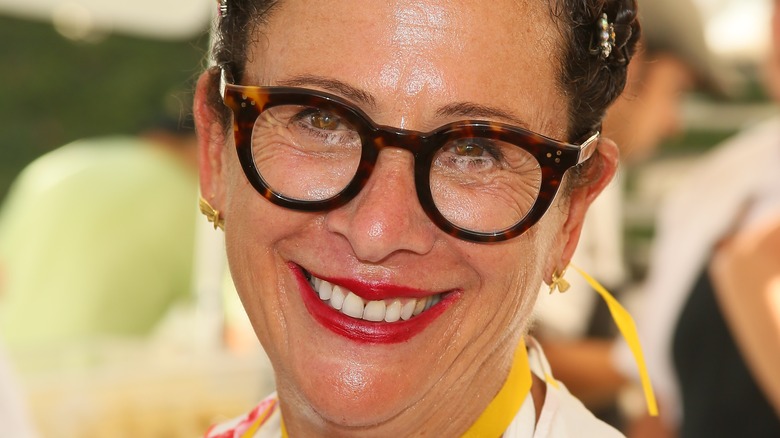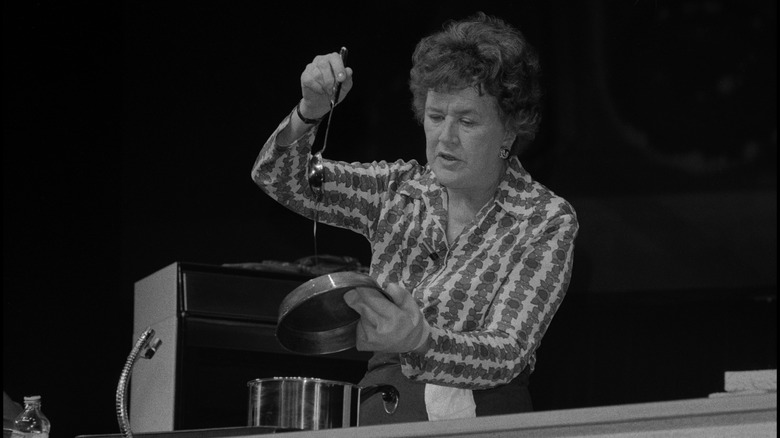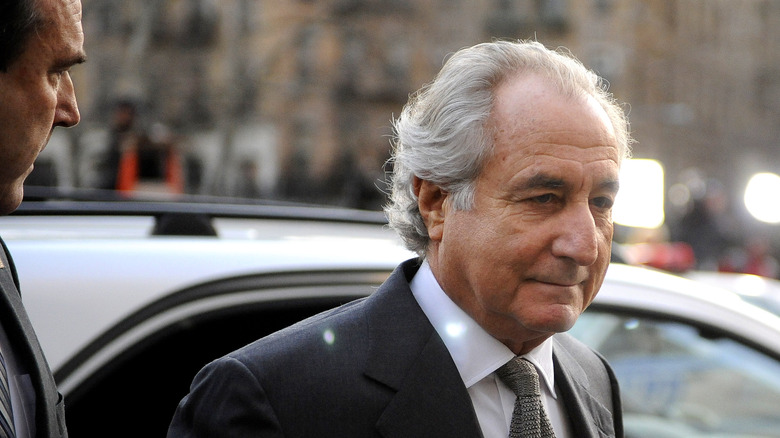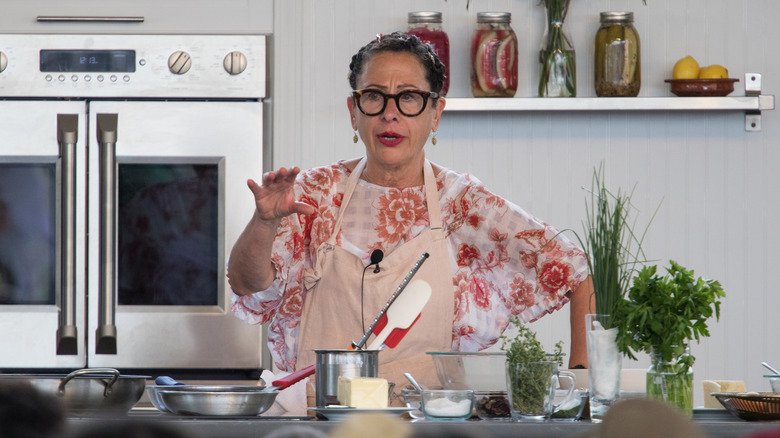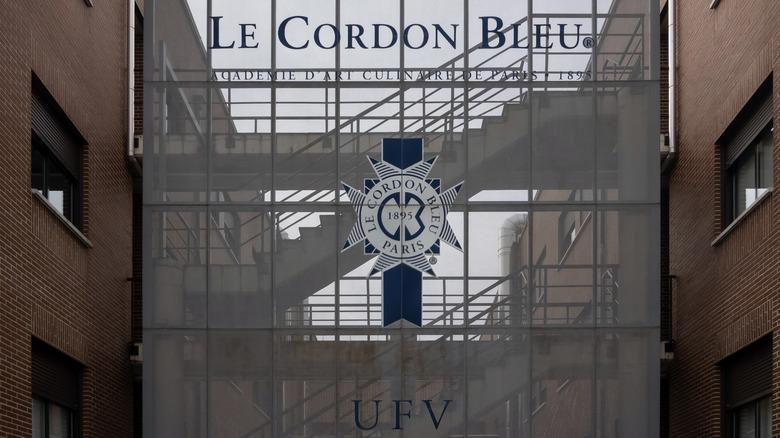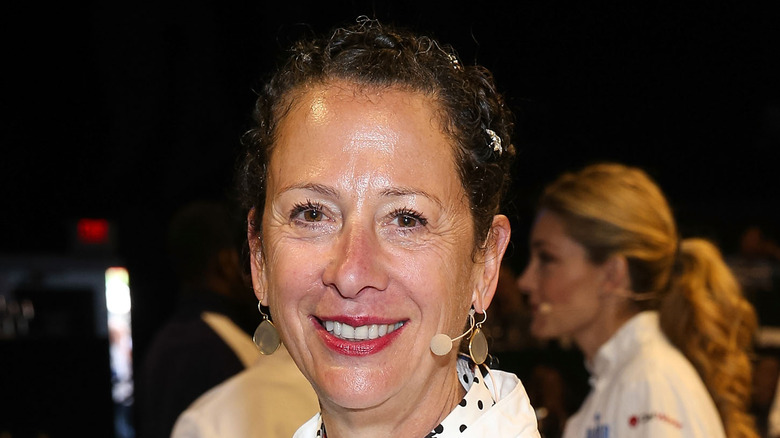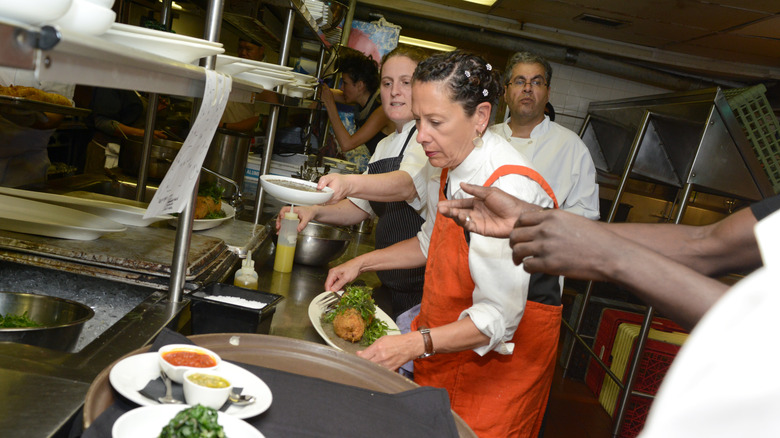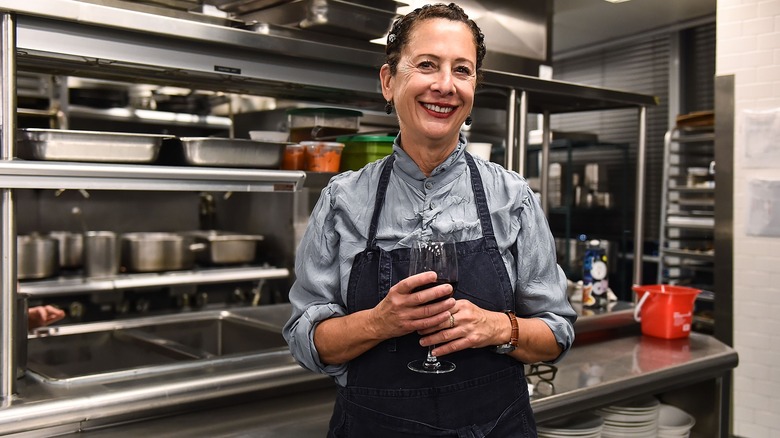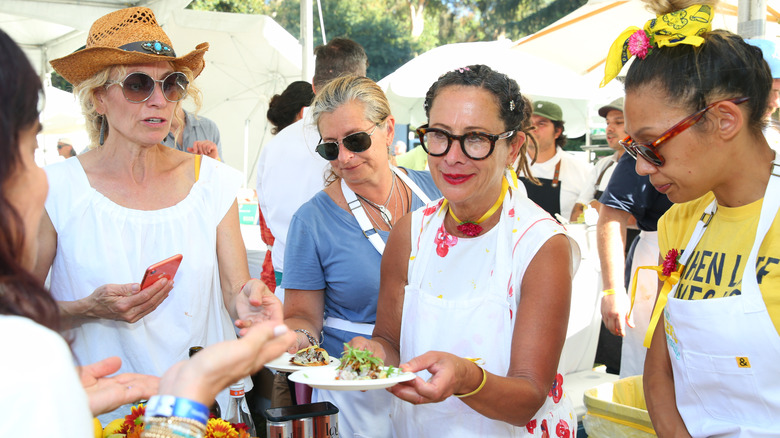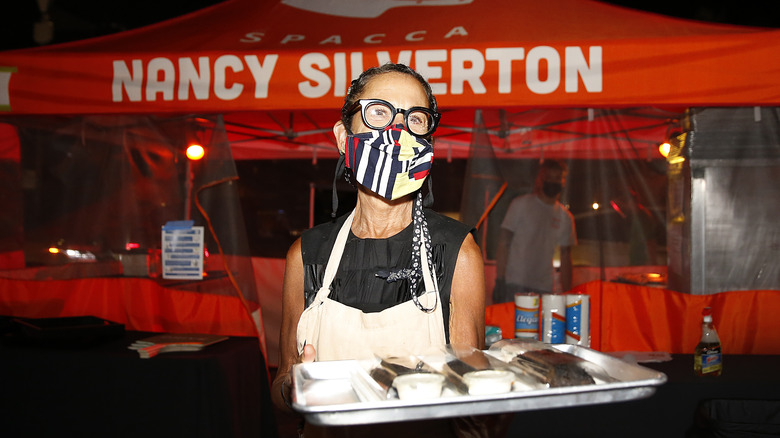The Untold Truth Of Nancy Silverton
Born in Sherman Oaks, a Los Angeles neighborhood, Nancy Silverton is now one of the most influential chefs in the country. She began cooking at a young age and helped to change the food and dining world in Los Angeles and beyond. Without Silverton, we may have never thought to entertain ourselves with sourdough starters during the long months of lockdown caused by COVID-19 (via "Chef's Table"). But luckily, Silverton's influence made artisanal bread a popular and accessible menu item — and these days, an equally popular and mostly accessible at-home hobby.
Silverton attended culinary school, and she later worked for Wolfgang Puck at his popular Beverly Hills restaurant, Spago. After her marriage to Mark Peel, whom Silverton met working at Spago, the couple opened Campanile, which quickly became a Los Angeles legend (featuring Thursday night grilled cheese specials).
When Peel and Silverton divorced and Silverton sold her shares to the restaurant, she began brainstorming ideas for a new concept. Silverton's travels to Italy's Umbria region inspired her to create a restaurant that focused on the simple-yet-delicious flavors of Italy — most importantly, mozzarella (per Departures). Today, Silverton is still hard at work at Pizzeria Mozza and Osteria Mozza, located on Melrose Avenue in Los Angeles.
Julia Child once cried over Nancy Silverton's dessert
In 1997, Nancy Silverton was a guest on Julia Child's television series, "Baking with Julia." Silverton, then the co-owner with her husband, Mark Peel, of Campanile and La Brea Bakery, makes Child a Crème Fraîche Custard Brioche Tart served with fruit compote. Silverton uses a yeasted dough made with butter and eggs for the brioche crust and a simple crème fraîche and egg mixture for the filling.
After Silverton tops the slice of tart with ice cream, toasted almonds, and powdered sugar, she watches Child, legend of legends, take a bite. Child pauses, and Silverton attempts to fill the silence (she thought the hot compote had burned Child's mouth, according to LA Weekly) before Child puts her hand on Silverton's back, tears in her eyes, and exclaims, "It's a dessert to cry over!" She calls the dish a "triumph" and "about the best dessert I have ever eaten" (via YouTube).
Silverton said that that moment was a highlight of her career. She described Child as a "larger than life" character, "towering, like six feet tall. ... For her to say [that]... it really meant something to me," Silverton told LA Weekly.
In 2008, Nancy Silverton lost millions in a Ponzi scheme
In 2001, Nancy Silverton sold her world famous La Brea Bakery and walked away with over $5 million, which she entrusted with an advisor to invest. Unfortunately for Silverton, her advisor was working with Bernie Madoff, the financier who would go on to become known for orchestrating one of the biggest Ponzi schemes in history; he took many wealthy business owners down with him in 2008, Silverton among them (via the Los Angeles Times).
Silverton found out through her father, who called while she was driving from her home in L.A. to Napa Valley in Northern California. "He said, 'I want to tell you something. Everything's gone. We lost everything,'" Silverton recounted to the Los Angeles Times.
Losing the money from the sale of La Brea Bakery meant Silverton lost all her savings, her retirement fund, and the money she had set aside for her three children. "I need to reinvent my life," she lamented at the time. "Now I'm just like 99% of the world. If I had to retire tomorrow, I could not."
Nancy Silverton started to pursue cooking after an epiphany in college
Nancy Silverton wasn't always a chef, but it didn't take long for her to realize that she would be one in the future. Silverton attended Sonoma State College and studied political science. "My father was a lawyer and I thought maybe I would be a lawyer," she explained in an interview in Food GPS.
But one day, during her freshman year of college, Silverton had an epiphany that would change her life and make her the renowned celebrity she is today. "I was cooking in the dorms in a stainless steel kitchen," she continued. "Cooking vegetarian food for the vegetarian members of the dormitory, and I remember this lightbulb going off and thinking, 'Oh, wait, this is what I want to do for the rest of my life.'"
Instead of finishing college, Silverton dropped out to attend culinary school, and never looked back. "I wake up every day and do what I am meant to do," she added. "More than just the restaurants, more than just the cooking, it's the hospitality, that feeling."
Nancy Silverton attended Le Cordon Bleu
Once Nancy Silverton realized she wanted to cook for a living, she told her parents that she wanted to drop out of Sonoma State College. "I said I wanted to be a cook," she told Los Angeles Magazine. And while some parents might have wished their daughter had more traditional ambitions (especially for a woman in the '70s), Silverton's parents were encouraging — with one exception. "My father said, 'OK, as long as you enroll in Le Cordon Bleu,'" she recalled. Silverton, at that time, didn't even know what Le Cordon Bleu was. "But I went in 1977," she continued. "And I was not a good student."
But the reason for Silverton's poor Le Cordon Bleu grades may have also been the reason for her success later in life. She said she struggled most with baking, questioning her instructors' strict rules and precise measurements. Perhaps even then Silverton felt she was capable of making something better. "There was no room for creativity or individuality," she added. But lucky for us, Silverton didn't lose her creative spark to Le Cordon Bleu — or anyone else, for that matter.
Nancy Silverton was criticized for a poorly executed op-ed
When Nancy Silverton's Mozza restaurants were damaged in the protests following George Floyd's murder, Silverton took to the Los Angeles Times op-ed section in what ended up being a clumsy attempt to voice her support for the Black Lives Matter movement. The piece was criticized by Twitter users, food writers, and staffers at The New York Times for racist and insensitive language.
Written with Michael Krikorian, a former writer at The New York Times and Silverton's partner, the piece encourages Mozza fans not to worry about the restaurants and instead focus on the greater movement taking place. But Silverton describes how protesters "scatted like roaches," and pointedly comments on their "shiny, newish cars."
Silverton and Krikorian also call the COVID-19 pandemic "that Wuhan, China, bat thing," to which a food writer for The New York Times food replied on Twitter, saying "Yep, I remember. I remember how flip, inaccurate descriptions of COVID-19 led to an increase in hate crimes against Asian-Americans. Disappointed in this piece by Nancy Silverton."
Nancy Silverton is not a chef -- she's a cook
Despite her well-earned fame and fortune, Nancy Silverton refuses to be called "chef," unlike many restaurant czars, big or small. When asked in an interview for Marketplace whether she was an entrepreneur or a chef, Silverton said, "I'm neither. I'm a cook."
When she first began cooking in restaurants in school, Silverton said she was given a button-down white jacket to wear, along with the other chefs in the kitchen. "I was like, 'Wow, only chefs wear buttoned down white jackets,'" she shared. "And I never wore one again. So, there you go." So instead of donning a pristine white jacket when she steps into the kitchen, Silverton arrives at the restaurant ready to work. "I like to get my hands dirty," she added.
According to Jonathan Gold, Silverton's appreciation for hard work derives from more than just a strong work ethic. In Silverton's episode of Netflix's "Chef's Table," he said Silverton's neurotic perfectionism would be called OCD "under different circumstances." Mario Batali (who co-owned Silverton's restaurants with his company until he was accused of rape and sexual harassment in 2018) put it another way: "It's not obsession. It's sickness. It's a twisted, inside-her-mind, Los Angeleno, crazy person thing," (via "Chef's Table").
Nancy Silverton was one of the first artisanal bread bakers in Los Angeles
In Silverton's episode of "Chef's Table," you learn that before 1982, when Wolfgang Puck opened Spago in Beverly Hills, most restaurants in L.A. didn't put much thought into the bread they served; it was thrown into a bowl and served with a pat of butter to appease customers while chefs focused on the main course. According to the Los Angeles Times, San Francisco's bakeries started producing handmade artisanal breads well before L.A. caught up — and L.A. eventually did catch up largely because of Nancy Silverton.
When Silverton and her husband bought the space for Campanile, Silverton saw an opportunity to run an adjoining bakery in the location next door. But it wasn't always easy — baking bread is a grueling art of precision, and the profits don't reflect the effort that goes into each loaf.
At first La Brea Bakery received complaints; the bakery sold loaves of bread, which upset many people who were looking for cakes and cupcakes. And as the first artisanal bakery in the area, many folks were surprised by the rustic appearance and flavor of the breads. "It took a little while to win people over, but when we were selling out at 11 a.m. or 1 p.m. every day, we realized we were on to something," Silverton recalled. A year into the endeavor, on Thanksgiving of 1990, the line to La Brea stretched on for several blocks.
Nancy Silverton's history in bakeries led to LA's Pizzeria Mozza
After Silverton sold La Brea Bakery and split up with husband Mark Peel, she had the idea to open an Italian restaurant in L.A. As the queen of artisan bread, she would surely be capable of making an otherworldly pizza dough, and with strong ties to Italy, it seemed the perfect new venture.
Silverton teamed up with chefs and restaurateurs Mario Batali and Joseph Bastianich to open two neighboring spots on Melrose Avenue, one of which would become Osteria Mozza, the more upscale restaurant to Pizzeria Mozza, a simpler pizza joint. The pizzeria, surprisingly, took off before the restaurant was even finished, but Silverton rolled with it, though she "never, ever, ever, ever" expected such success to come from a "small, little, loud restaurant" (per The New York Times).
According to the Times, Silverton's pizza crusts were inspired by pizza bianca, a kind of pie made in Rome, which is topped with just olive oil and herbs. The focus, then, is on the dough, which combines a crunchy exterior with a soft and chewy interior. Silverton's dough is made with rye flour and malt, and it gets cooked to perfection in a 700-degree terra cotta pizza oven.
Nancy Silverton's love of cheese was born in Italy
It's not exactly surprising that Silverton is a local in Italy — after all, she has several restaurants dedicated to the cuisine. Her favorite place to travel is a region called Umbria (think green hills and medieval castles), on the border of Tuscany and Lazio. Silverton spends six weeks there every year. "I love Umbria so much I bought a small house there in a little hilltop town," she told Departures.
Silverton's first trip to Italy, when she was working as a pastry chef for Wolfgang Puck, inspired her to keep her dishes simple yet flavorful, according to Viva. When she later owned property in Umbria, she would cook for friends at her house. Once, inspired by a restaurant in Rome that featured mozzarella as its star ingredient, Silverton set up a mozzarella bar for her guests, with roasted tomatoes, bread, olives, and other toppings and spreads on the side. It was this simple lunch that inspired Osteria Mozza, where diners can choose from a selection of cheeses in the "mozzarella bar."
For 18 years, Nancy Silverton ran Campanile with her ex-husband, Mark Peel
Over the course of Nancy Silverton and chef Mark Peel's 20-year marriage, the couple owned and operated a popular Los Angeles restaurant from 1989 to 2007. Campanile's menu consisted of American classics like grilled cheese and Italian-style pastas.
Peel is a successful chef in his own right who worked at renowned restaurants like Chez Panisse and Spago before opening Campanile with Silverton. The late food writer Jonathan Gold wrote that Peel was "the most exacting grill chef in the country, a master who plays his smoldering logs the way that Pinchas Zukerman does a Stradivarius." Peel continued running the restaurant without Silverton for five years, before closing in 2012.
Campanile became an L.A. institution, garnering James Beard awards and local prestige. Upon its closure, Gold noted Campanile's popular status in the L.A. food scene and beyond. "It is hard to overstate Campanile's contributions to American cooking," he wrote in the Los Angeles Times. Additionally, in another article in the Los Angeles Times, Betty Hallock called Campanile a "storied restaurant" whose "distinctly American approach using top-quality farmer's market ingredients helped set the tone for Los Angeles dining in the 1990s."
In 2018, Nancy Silverton's restaurant group ended its partnership with Mario Batali
In 1998, Mario Batali created the Batali & Bastianich Hospitality Group, which owned many restaurants across the U.S., Italy, Singapore, and Honk Kong (via The New York Times); some of which were Nancy Silverton's Pizzeria Mozza and Osteria Mozza.
To that end, in 2018 at the height of the #MeToo movement, Silverton found herself in the line of fire. When allegations from women who worked with Batali at The Spotted Pig went public, Silverton and others decided to buy Batali's shares of the restaurant group, in an effort to separate themselves from the disgraced chef. In a letter by the group's members, they called these accusations of rape and sexual harassment "chilling and deeply disturbing" (per Today).
"Our partnership with Mr. Batali is ending," the statement read. Additionally, Silverton took up executive roles in the new iteration of the company. Furthermore, she and the rest of the investors vowed that the restaurants would, under new management, be committed to equality and anti-discrimination.
In March of 2020, Nancy Silverton contracted COVID-19
In March of 2020, in the early days of the COVID-19 pandemic, Silverton shut down her restaurant along with most other restaurateurs in the country. But before the CDC even began recommending masks, she was exposed to COVID-19. "Back then, we knew it was serious, but we didn't know how serious," she told Shondaland.
Soon after, Silverton tested positive for COVID-19. "For the next 14 days, I thought every night before I went to bed, 'Maybe this is the night that I'm going to get those symptoms that people are talking about,'" she continued. But luckily, the symptoms never showed. Silverton spent 14 days in isolation, but all she felt was a nightlong backache. At the time, COVID-19 tests were limited, and it was mostly symptomatic patients who were able to get tested. If Silverton hadn't received a test, she likely would have continued working and caused the virus to spread among her employees.
Nancy Silverton is starring in Season 11 of MasterChef
There's a reason the eleventh season of Fox's hit cooking show is called "MasterChef: Legends." In addition to the show's returning host, Gordon Ramsay, the "cheftestants" will be joined and aided by a slate of longtime hard-hitters in the culinary world, Nancy Silverton among them. "I think that bringing that level of help into this amateur world will help lift that standard," Ramsay explained to Parade. Silverton will be joined by fellow star chefs such as Emeril Lagasse, Paula Deen, and Wolfgang Puck.
The new season of "MasterChef" premiered in early June of 2021, and featured 15 novice chefs competing for a first-place prize of $250,000. Silverton assists the contestants as they cook their way through the competition, offering mentorship and tips from her decades of experience.
However, "MasterChef: Legends" has already faced some controversy; viewers have complained that the guest judges aren't "legends" any more than previous judges were in seasons that weren't deemed legendary. Nonetheless, it's sure to shape up to be another exciting season of the series, and we're pretty convinced the contestants will be able to find something to learn from Silverton and her fellow seasoned chefs.
